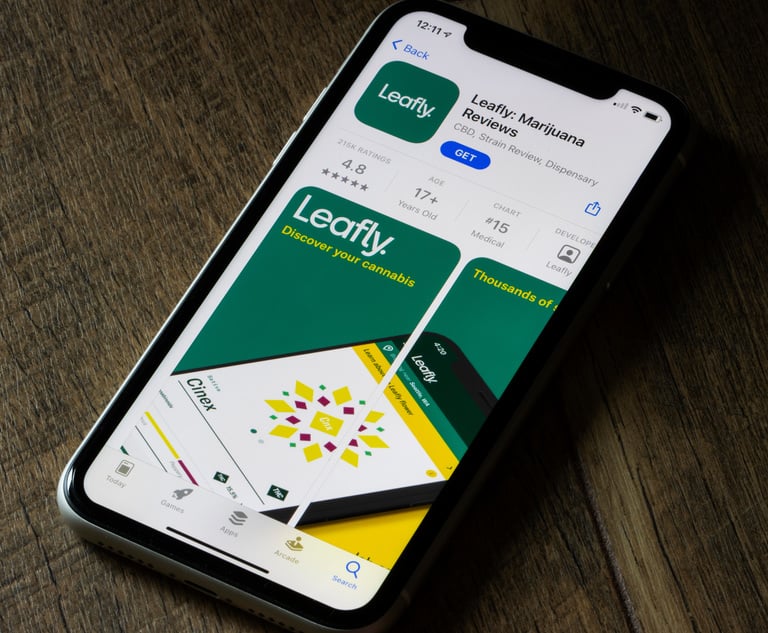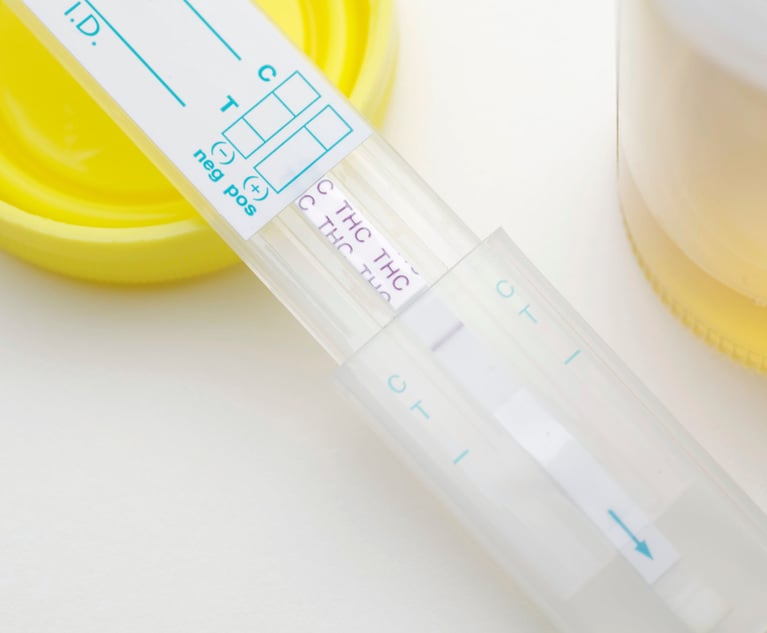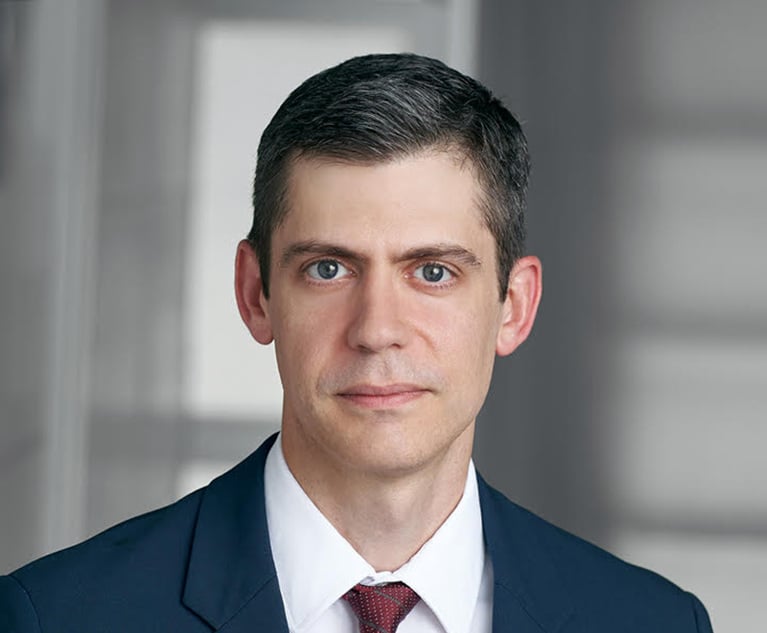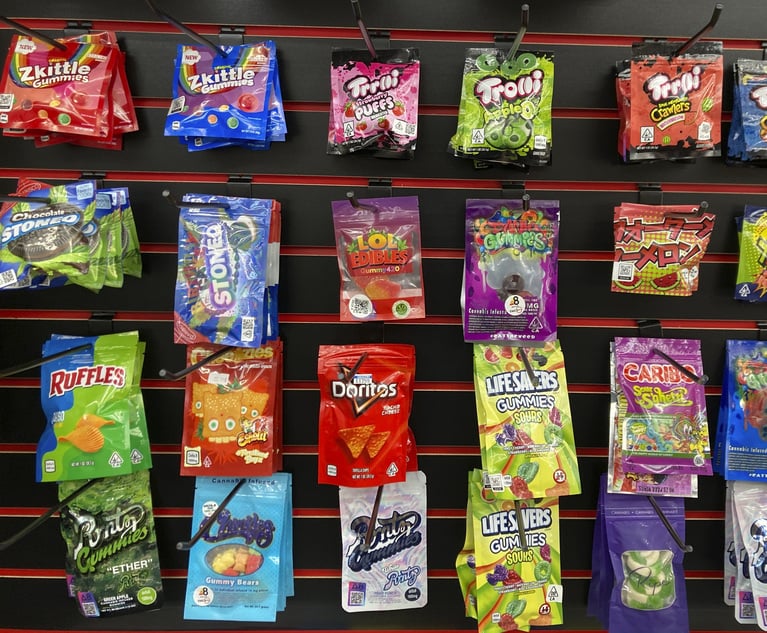Higher Law: Early Federal Court Win for CBD Patent Holder | Duane Morris Jumps into 9th Circuit Hemp Case | LA Warns Buyers: Fear Unlicensed Weed
Welcome to Higher Law—we've got a new court order in a closely watched patent fight in Colorado, and a hemp case is picking up in the Ninth Circuit. And check out Who Got the Work below.
April 18, 2019 at 04:00 PM
9 minute read
Welcome back to Higher Law, our weekly briefing on all things cannabis. I'm Cheryl Miller, reporting for Law.com from Sacramento. Who wants to read the redacted Mueller report when there's pre-4/20 news to catch up on?
By the way, if any of you are checking out noted cannabis entrepreneur Snoop Doggin San Francisco this weekend, I want pictures. Likewise, if you're in Denver on Saturday and sample Carl's Jr.'s CBD-infused “Rocky Mountain High” burger –cost: $4.20, naturally–I want a review. Beware of FDA officials, though.
This week, we update the status of two big lawsuits in the cannabis world. Plus, Los Angeles has a new motto in fighting unlicensed sellers: fear bad weed. And scroll down to see who got the work.
Thanks for reading on such a busy news day. Please send your tips, feedback and best CBD-related recipes to [email protected]. Or you can call me at 916-448-2935. Follow me on Twitter at @capitalaccounts.

Judge Gives CBD Patent-Holder Early Win
A federal judge has refused to grant summary judgment in a closely watched patent infringement claim involving CBD.
U.S. District Judge William Martinez of the District of Colorado on Wednesday heldthat Pure Hemp Collective, a CBD-product retailer, failed to show that United Cannabis Corporation's '911 patent on a liquid cannabinoid formulation “is anything” like an unpatentable “natural phenomenon.”
“The 911 Patent specifies threshold concentrations of cannabinoids and related chemicals,” Martinez wrote. “Pure Hemp nowhere claims that these precise concentrations, or anything close to them, occur in liquid form in nature. Accordingly, UCANN's claims are not restatements of “the handiwork of nature.””
The ruling is a blow for Pure Hemp Collective, which had argued that of all the claims asserted by United Cannabis were invalid.
Patent lawyers and the cannabis industry have been following the first-of-its-kind case to see how it would be received by the federal courts and because of the potentially long reach of United Cannabis' broad patent.
United Cannabis Corp is represented by Cooley partner Orion Armon and partner Orion Armon. Pure Hemp Collective's attorneys are Donald Emmi of Hunsaker Emmi and James Gourley of Carstens & Cahoon.

Idaho's Hemp Battle Continues
Duane Morris attorneys have jumped into the fray over a hemp company's Ninth Circuit fight to recover a $1 million shipment seized by Idaho state police.
In an amicus curiae brief submitted on behalf of The American Trade Association of Cannabis and Hemp, Duane Morris partners David Landau and Seth Goldbergand associate Joseph Pangaro write that, if the court doesn't force Idaho to give back a truck-trailer full of hemp owned by Big Sky Scientific, “transportation of lawfully cultivated or processed hemp will be prohibited across many state lines.”
To recap: Idaho police in January nabbed Big Sky Scientific's cargo as it was shipping from a cultivation site in Oregon to a processing facility in Colorado. Idaho contends that under its laws any product that contains THC—even if it's less than 0.3 percent, like hemp—is illegal.
Chief U.S. Magistrate Judge Ronald Bush of the U.S. District Court in Idaho refused to order the shipment returned immediately, finding that the hemp was grown before Congress made the interstate shipping of the crop legal in the 2018 Farm Bill, and therefore it was unprotected by its provisions.
>> Attorneys for Idaho state officials filed a 113-page answer (including addendums) to Big Sky's appeal late Wednesday.
“The district court's decision is consistent with what the law actually says, which is that the 2018 Farm Bill protects the interstate commerce of hemp only if it is produced in accordance with the bill's regulatory framework,” they wrote. “Because Big Sky has not shown, and cannot show, that its contraband was produced within that regulatory framework, the district court's decision was entirely correct.”
The American Trade Association of Cannabis and Hemp argues that the hemp was grown legally under an Oregon law enacted in 2014.
“The lower court improperly concluded that the 2018 Farm Bill's prohibition against state interference with the shipment of hemp is not effective until the United States Department of Agriculture promulgates regulations and approves state hemp programs,” the Duane Morris attorneys wrote. “The interstate commerce provision contains no such limitation and must be read in conjunction with the section of the new law grandfathering in the existing program.”
Oral arguments have not yet been set in the case.
>> Why grow kale that sells for $1 a pound when you can get $30 or $40 per pound for hemp? That's what a lot of farmers are asking themselves as the CBD craze is generating a new cash crop. CNN.com has an interesting read here.
LA Stokes Fear Over Unlicensed Pot
The city of Los Angeles is trying a new tack to crack down on unlicensed pot shops: scaring the bejeezus out of their potential customers.
City Attorney Mike Feuer on Wednesday announced a lawsuit against Kush Club 20, alleging among other things that the Los Angeles dispensary sold marijuana that, when tested by the city, was found to contain paclobutrazol, a fungicide sometimes used on golf courses.
“If you buy from an unpermitted location, you're putting your health at risk,” Feuer said at a live-streamed press conference.
The suit names the dispensary, its operator, related companies and real estate agents as defendants in an alleged “scheme” that listed the outlet's business purposes as “church and all other legal related uses” on property documents. In the complaint, filed in Los Angeles County Superior Court, Feuer's office seeks an injunction against further unlicensed operations at the site plus civil penalties of up to $20,000 per day of illegal sales.
While the city has previously filed actions against 172 unlicensed outlets, Feuer said the lawsuit against Kush Club 20 is believed to be the first in the state to allege illegal pesticide contamination of marijuana.

Who Got the Work
• The lobbying arm of McGuireWoods has been retained by a startup marijuana trade organization, the California-based Global Alliance for Cannabis Commerce, to lobby federal lawmakers. As I wrote in The Recorder this week, the Global Alliance hasn't announced its membership yet, although it shares an address with a cannabis distribution facility owned by regulated-marijuana advocate Robert Taft Jr.
• Four firms advised Canopy Growth Corp. and Acreage Holdings Inc. in an acquisition deal potentially valued at $3.4 billion. A Paul Hastings team—partners Samuel Waxman, Yariv Katz, Joseph Opich, and associate Matthew Tippett—served as counsel to Ontario, Canada-based Canopy, which agreed to acquire all shares of Acreage “when” cannabis sales and production become legal in the U.S. Cassels Brock & Blackwell, led by partner Jonathan Sherman, is Canopy's Canadian counsel. DLA Piper Canada and Cozen O'Connor served as legal counsel to Acreage, which will receive an immediate $300 million payment.
• Georgia Ravitz and James “Jamie” Ravitz have joined Wilson Sonsini Goodrich & Rosati's life sciences practice as partners in the Washington, D.C., office. The siblings, who were partners at Arent Fox, have counseled clients in food and drug regulatory policy, including its impact on cannabis products.

In the Weeds
>> Colorado's U.S. attorney says he agrees with Jeff Sessions' rescission of the Cole memo. ”I think what Attorney General Sessions' point was, and I agree with, is that we as law enforcement should never be saying, 'We won't enforce the law,' especially when it comes to criminal activity,” Jason Dunn told the Colorado Sun. But don't expect Dunn's office to crack down on state-legal businesses. Dunn said his focus will be the black market and cross-border sales. [Colorado Sun]
>> Citigroup may be the next employer to opt out of pre-hire pot testing. The New York Post cites sources saying the bank is considering dropping marijuana screening in light of increased legalization in states around the country. The New York City Council last week voted to bar pre-employment marijuana testing for most non-safety-related jobs. [New York Post]
>> Students at UC Hastings College of the Law are learning lots about marijuana this spring. Twenty-four students are enrolled in the San Francisco-based law school's first-ever cannabis law course. Classes are taught by Henry Wykowskiand Wykowski & Associates principal Christopher Wood. [UC Hastings]
>> Meet “Public Enemy No. 1″ for legalization advocates in Maryland and Washington, D.C. In 2014, Congressman Andy Harris, R-Maryland, added language to a budget bill that barred the District of Columbia from creating the regulated marijuana market that District voters approved that year. Activists haven't let Harris forget it, showing up at his public events and even convening a pot-smoking protest outside his Washington office. [The Baltimore Sun]
>> The motto “Location, location, location” has taken on new meaning for marijuana companies in South Florida. My law.com colleague Lidia Dinkova writes that dispensaries “are limited in their options for new locations by local regulations and an almost-blanket inability to open in mortgaged buildings.” [Daily Business Review]

What's Next: The Calendar
April 23 - The CannaGather Awards will be held in New York City. Bruce Linton, chairman and CEO of Canopy Growth Corp., will be the key speaker.
April 23-25 - The Arcview Vancouver Investment Forum takes place. Dentonspartners Shea Coulson and Kimberly Burns and Osler, Hoskin & Harcourt partner Michael Watts are scheduled to participate.
April 25-26 - CannaMéxico World Summit 2019 convenes in San Cristóbal, Guanajuato. Scheduled speakers include Tom Zuber of Zuber Lawler & Del Duca; Barry Grissom, the former U.S. attorney for the District of Kansas; and Brazeau Seller Law associate Mario Torres.
This content has been archived. It is available through our partners, LexisNexis® and Bloomberg Law.
To view this content, please continue to their sites.
Not a Lexis Subscriber?
Subscribe Now
Not a Bloomberg Law Subscriber?
Subscribe Now
NOT FOR REPRINT
© 2025 ALM Global, LLC, All Rights Reserved. Request academic re-use from www.copyright.com. All other uses, submit a request to [email protected]. For more information visit Asset & Logo Licensing.
You Might Like
View All
NY Cannabis Marketing Rulings / Rescheduling Effects / Honigman's Work on Trademark Suit / Goodbye
9 minute read
Workplace Weed and Labor Pacts / State AGs and Hemp / Maryland Licensing Suit / Vicente Sues Recruiter
9 minute readTrending Stories
- 1Special Section: 2025 Real Estate Trends
- 2Snap Paid $63M in Fees to 2 Am Law 200 Firms in '24
- 3Lawyers Across Political Spectrum Launch Public Interest Team to Litigate Against Antisemitism
- 4Jones Day Names New Practice Leaders for Antitrust, Business and Tort Litigation and Latin America
- 5Russia’s Legal Sector Is Changing As Sanctions Take Their Toll
Who Got The Work
J. Brugh Lower of Gibbons has entered an appearance for industrial equipment supplier Devco Corporation in a pending trademark infringement lawsuit. The suit, accusing the defendant of selling knock-off Graco products, was filed Dec. 18 in New Jersey District Court by Rivkin Radler on behalf of Graco Inc. and Graco Minnesota. The case, assigned to U.S. District Judge Zahid N. Quraishi, is 3:24-cv-11294, Graco Inc. et al v. Devco Corporation.
Who Got The Work
Rebecca Maller-Stein and Kent A. Yalowitz of Arnold & Porter Kaye Scholer have entered their appearances for Hanaco Venture Capital and its executives, Lior Prosor and David Frankel, in a pending securities lawsuit. The action, filed on Dec. 24 in New York Southern District Court by Zell, Aron & Co. on behalf of Goldeneye Advisors, accuses the defendants of negligently and fraudulently managing the plaintiff's $1 million investment. The case, assigned to U.S. District Judge Vernon S. Broderick, is 1:24-cv-09918, Goldeneye Advisors, LLC v. Hanaco Venture Capital, Ltd. et al.
Who Got The Work
Attorneys from A&O Shearman has stepped in as defense counsel for Toronto-Dominion Bank and other defendants in a pending securities class action. The suit, filed Dec. 11 in New York Southern District Court by Bleichmar Fonti & Auld, accuses the defendants of concealing the bank's 'pervasive' deficiencies in regards to its compliance with the Bank Secrecy Act and the quality of its anti-money laundering controls. The case, assigned to U.S. District Judge Arun Subramanian, is 1:24-cv-09445, Gonzalez v. The Toronto-Dominion Bank et al.
Who Got The Work
Crown Castle International, a Pennsylvania company providing shared communications infrastructure, has turned to Luke D. Wolf of Gordon Rees Scully Mansukhani to fend off a pending breach-of-contract lawsuit. The court action, filed Nov. 25 in Michigan Eastern District Court by Hooper Hathaway PC on behalf of The Town Residences LLC, accuses Crown Castle of failing to transfer approximately $30,000 in utility payments from T-Mobile in breach of a roof-top lease and assignment agreement. The case, assigned to U.S. District Judge Susan K. Declercq, is 2:24-cv-13131, The Town Residences LLC v. T-Mobile US, Inc. et al.
Who Got The Work
Wilfred P. Coronato and Daniel M. Schwartz of McCarter & English have stepped in as defense counsel to Electrolux Home Products Inc. in a pending product liability lawsuit. The court action, filed Nov. 26 in New York Eastern District Court by Poulos Lopiccolo PC and Nagel Rice LLP on behalf of David Stern, alleges that the defendant's refrigerators’ drawers and shelving repeatedly break and fall apart within months after purchase. The case, assigned to U.S. District Judge Joan M. Azrack, is 2:24-cv-08204, Stern v. Electrolux Home Products, Inc.
Featured Firms
Law Offices of Gary Martin Hays & Associates, P.C.
(470) 294-1674
Law Offices of Mark E. Salomone
(857) 444-6468
Smith & Hassler
(713) 739-1250










